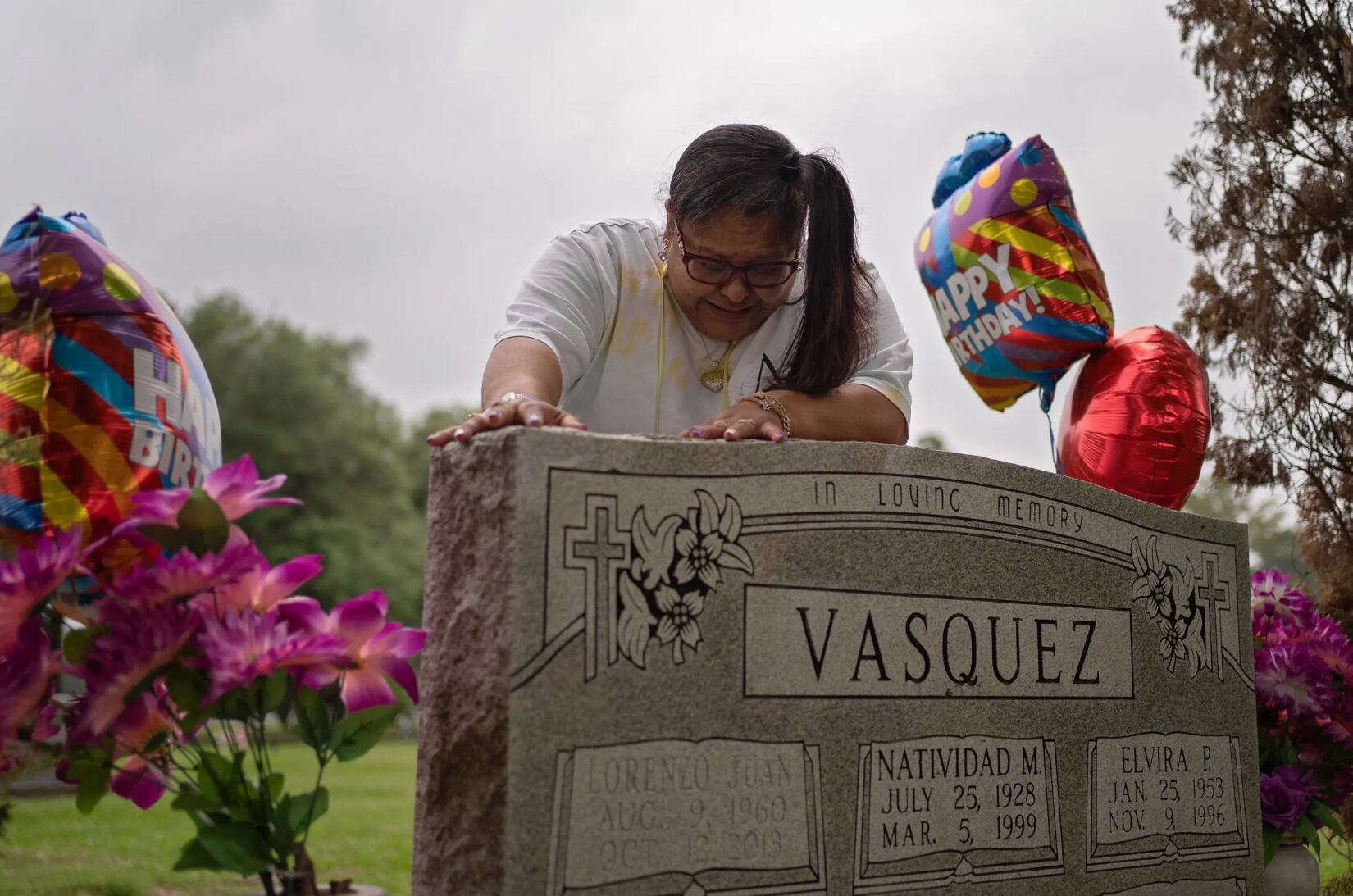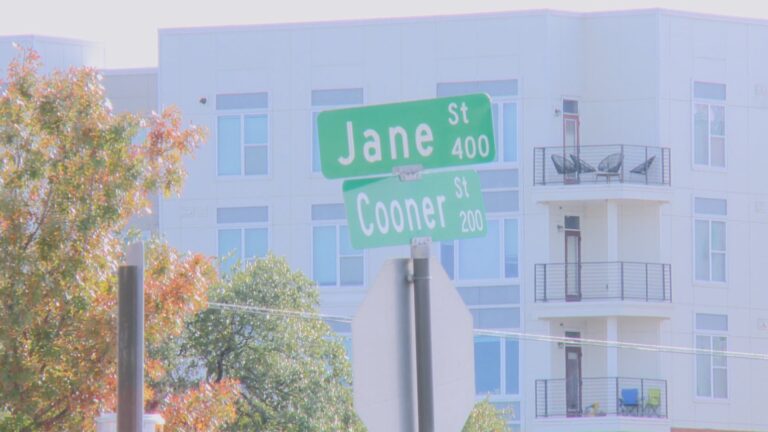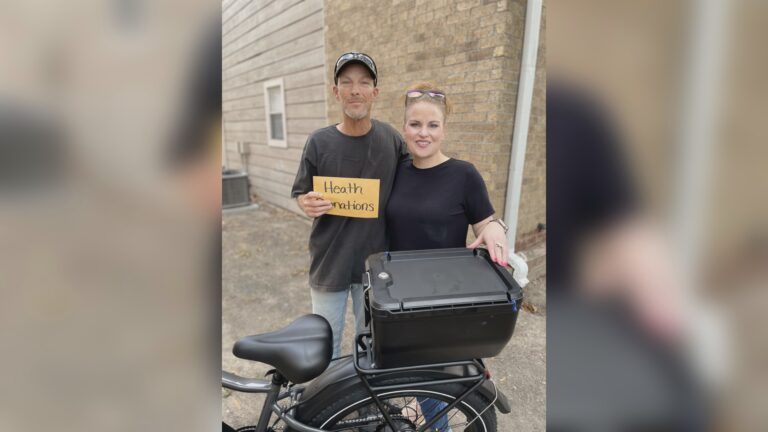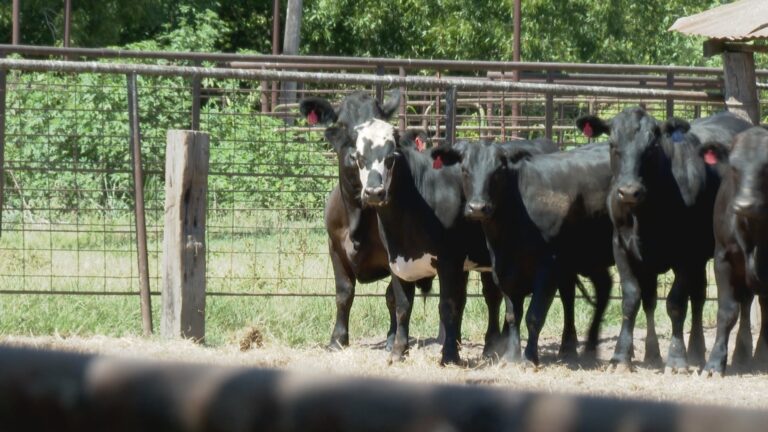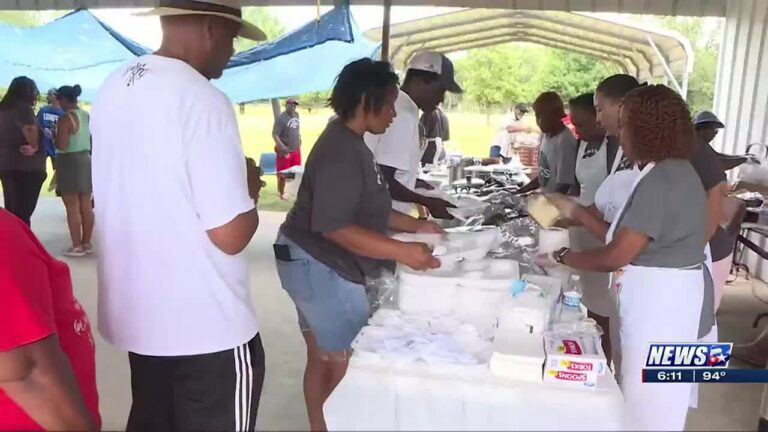When Texas jail standards push inmates to lockups in other states, oversight doesn’t follow
“When Texas jail standards push inmates to lockups in other states, oversight doesn’t follow” was first published by The Texas Tribune, a nonprofit, nonpartisan media organization that informs Texans — and engages with them — about public policy, politics, government and statewide issues.
HOUSTON — The Kinner & Stevens Funeral Home wouldn’t open for hours, so Sarah Knight sat in the parking lot with one thought consuming her: The body inside was not her son’s.
Nothing about the 1 a.m. phone call from the Harris County Sheriff’s Office made sense. Jaleen Anderson was still awaiting his day in court on a felony drug possession charge when he was shipped to a Louisiana prison because Harris County Jail didn’t have room for him. And then for the healthy 29-year-old to just suddenly die behind bars? That was even harder to comprehend.
But when the Louisiana coroner and funeral home director unzipped the body bag, Knight’s worst fear became real.
“I asked God to bring him back to me,” she said, recounting the moment she saw her son’s body in the Jena, Louisiana funeral home 268 miles from their home in Houston’s Kashmere Gardens. “I said, ‘This was an untimely death. He had no business dying at this age.’”
On April 3, Anderson was among hundreds of Texans accused of crimes — and still legally presumed innocent — sitting behind bars in other states. As an increasing number of Texas jails face overcrowding and understaffing, more and more people with criminal charges are being shuffled to other lock-ups while they await the resolution of their cases.
And while state jail standards meant to protect people awaiting trial partially led Harris County to ship Anderson to LaSalle Correctional Center, Texas jail officials’ oversight of conditions inside lock-ups doesn’t cross state lines.
In the months since Anderson’s death, his mother has been on two missions. First, Knight has pushed Louisiana officials and leaders at the prison where Anderson died for answers about whether her son got the medical attention he needed after he began having seizures. And at public meetings from Houston to Austin, she’s implored county officials and state leaders to stop shipping Texans defending themselves against criminal charges to out-of-state lockups.
So far, she’s made little headway.
“What are you going to do to prevent this from happening again?” Knight asked state leaders during an August public meeting. “Jaleen is not the first person that has lost his life and if you all don’t stop sending our loved ones to these facilities, he will not be the last.”
LaSalle Correctional Center warden John Stuckey, when reached by phone, declined to answer questions about Anderson and directed questions to a spokesperson. The company did not respond to a list of written questions.
A Harris County spokesperson said the investigation into Anderson’s death is ongoing, the autopsy is not complete and the medical examiner has not yet determined the cause of death.
Louisiana’s jail standards are considerably weaker than Texas’. A 2023 report that Louisiana officials requested found there is no oversight mechanism for the state’s minimum jail standards, which lack detail and aren’t regularly updated. Louisiana does not require facilities to report deaths in custody to the state’s attorney general, unlike in Texas. The report provided recommendations for new policies, including requiring an independent investigation of deaths-in-custody and an assessment of the quality of medical care provided to inmates who die. But the lawmakers there so far have not enacted them.
During the recent meeting where Knight testified, Duane Lock, one of nine people Gov. Greg Abbott appointed to the Texas Commission on Jail Standards, criticized the fact that Texas officials have no explicit oversight of out-of-state facilities, even when the state’s criminal defendants are sent there.
A t-shirt showing the face of Jaleen Anderson. Credit: Danielle Villasana for The Texas Tribune
“Is this something that needs to be moved to the Legislature?” Lock said. “Because I have some fundamental concerns about someone who, through no fault of their own, might end up in the hands of someone who might mistreat them.”
For years, LaSalle Corrections has been under fire for claims of medical neglect. More than 100 lawsuits have been filed against the Louisiana company saying that it did not provide adequate medical care, Truthout reported in 2022.
Last year, LaSalle Corrections agreed to pay a $7 million legal settlement after a Texas woman died in a Texarkana jail while it was operated by LaSalle. The federal lawsuit said that corrections staff ignored the woman’s worsening health and took her to the hospital when it was too late.
Harris County’s contract with LaSalle states that the private facility must adhere to Louisiana’s “best practices,” but the private facility is not required to meet Texas’ minimum jail standards.
“There aren’t a lot of five-star rated jails out there,” said Jason Spencer, chief of staff at the Harris County Sheriff’s Office. “I don’t think you’ll find a jail that people will say, ‘Yeah, that’s a great one.’ It’s not a place people want to be. But if there were significant red flags, that’s obviously something we’ll have to look at.”
A young man with a plan
Jaleen Anderson enjoyed boxing and performing back flips. And despite his short stature, he could dunk a basketball. He worked in warehouses and on assembly lines, and he looked forward to returning to work on his release from jail.
In October 2023, he was arrested and charged with a second-degree felony for possession of 9.2 grams of methamphetamine. Knight paid a bail bond company to keep him out of jail. But then he was re-arrested in March 2024 for possessing an unspecified amount between 4 and 200 grams of methamphetamine. This time, a judge denied Anderson bail.
Knight isn’t convinced the drugs were Anderson’s the first time he was arrested. The second time, she suspects he was selling narcotics to support his family because the first arrest made it difficult for him to find a job.
While in Harris County Jail, Anderson decided he never wanted to be locked up again, family members said. He talked about getting a job as a food delivery driver or becoming a barber like his dad. His previous jobs had only paid him about $2,300 a month, an affidavit states. He wanted to increase his earnings to support his kids, and the one that would be born in October.
Jaleen Anderson’s daughters, Paris and Aminah, play at their grandmother’s house in Houston. Credit: Danielle Villasana for The Texas Tribune
“He wasn’t a young man without a plan,” Knight said.
On March 22, Knight was surprised she hadn’t received a phone or video call from her son in the Harris County Jail. She usually heard from him every day. When she called the jail, she was shocked to learn Anderson was on the way to Louisiana.
Neither Anderson’s family members nor his court-appointed attorney were told he would be moved. Anderson had no say in the matter.
The next day, Knight spoke with him after he’d arrived at LaSalle.
Anderson’s next court date was scheduled for April 23. He looked forward to the hearing because he hoped to get out of jail on probation and move forward with his life.
Instead, Anderson was pronounced dead at 8:59 p.m. on April 3 at the Hardtner Medical Center Emergency Room. That hospital sits less than a mile from LaSalle Correctional Center, the northeast Louisiana facility that houses up to 650 Harris County jail inmates.
When Anderson had arrived at the hospital, his heart was no longer beating. Doctors tried to revive him. They performed CPR, intubated him, and administered epinephrine three separate times. For a moment, he had a pulse again. But it quickly disappeared. Code was called: cardiac arrest.
Before transferring him to LaSalle, health staff at Harris County Jail reviewed Anderson’s medical record and found that he didn’t have any significant medical conditions or needs, according to a spokesperson.
But in LaSalle, Anderson experienced multiple seizures, according to medical records his family shared with The Texas Tribune. After experiencing two seizures, Anderson was moved from the general population to a one-person cell, where corrections officers could more closely watch him and respond to a medical emergency, Anderson’s family members said. The next day — the day of his death — Anderson was seen for a neurological assessment at the prison, records state. The results of the assessment were not provided. Anderson suffered four more seizures, including one that lasted at least 10 minutes.
Harris County’s contract with LaSalle stipulates that the Louisiana prison must have on-site medical and health care coverage available 24 hours a day, seven days a week. Health care providers must be CPR certified, and the facility has to have external defibrillators, devices that can be used to treat a person whose heart has stopped working.
Sarah Knight, center, looks for birthday decorations at a store to celebrate what would have been her son’s 30th birthday. Credit: Danielle Villasana for The Texas Tribune
Following reports of assaults against inmates at out-of-state facilities, Harris County sent compliance teams to inspect LaSalle as well as the Mississippi jail that houses Harris County inmates, Chief Deputy Mike Lee said at a Feb. public meeting. Based on an inspection report, LaSalle’s health clinic is “well-equipped.”
Still, it isn’t clear if medical personnel at LaSalle intervened while Anderson experienced seizures.
“After the second seizure, don’t you think they should have called EMS?” said Harold Anderson Jr., Anderson’s father. “They gave up and just let my son die.”
A mother seeks answers as jail deaths rise
Knight immigrated from Mexico City in 1982, when she was 8 years old. She started a church in her neighborhood in northeast Houston and serves as the pastor there. Her voice is naturally strong, her tone firm.
Just weeks after her son died — and on the same day he had been slated to appear before a judge on his criminal charges — Knight stood before the Harris County Commissioners Court. Her voice trembled as she described her pain and the little she had gathered about Anderson’s death.
Commissioners offered condolences and promised to get her answers about Anderson’s death.
“I really don’t think we should be OK with these deaths,” said Harris County Judge Lina Hidalgo, a Democrat who presides over the commissioners court. “Committing a crime pretrial is not a death sentence.”
Minutes later, commissioners agreed to spend another $3.1 million to send the county’s jailed defendants to LaSalle.
Knight said it was a slap in the face.
“I want to see that place bulldozed,” she later told The Texas Tribune in an interview. “The only thing that will give me peace is that this facility closes down.”
Raven Hall, right, shows Aminah Anderson, left, where her father’s name will be engraved on a tombstone at Paradise Funeral Home and Cemetery North. Credit: Danielle Villasana for The Texas Tribune
Jail deaths occur everywhere, not just in private facilities like LaSalle. And they are on the rise. Nationally, the 2019 jail mortality rate was 167 deaths per 100,000 inmates, an 11% increase since 2000, a federal report found.
This year alone, jail inmates have died in both rural and urban Texas counties, including Tarrant, Harris, and Bexar. On June 10, U.S. Rep. Marc Veasey, D-Fort Worth, sent a letter to the Department of Justice urging them to launch an investigation into the “distressing pattern of inmate deaths and jail incidents” at Fort Worth’s Tarrant County Jail.
Families of nine people who died in Harris County Jail are suing local officials there. The FBI is also conducting a civil rights investigation over deaths in the Harris County Jail.
Harris County has been sending inmates to Louisiana off and on since at least 2008 and now spends upwards of $50 million a year on outsourcing. The vast majority of its inmates are awaiting trial and are legally presumed innocent.
Texas law requires the reporting and investigation of deaths of people in jails or prisons within the state. Those requirements do not apply to inmates who die out-of-state.
“We have no oversight once a county makes a contract with another state,” said Ricky Armstrong, TCJS’ assistant director. “It’s up to that state to follow the rules.”
That makes it difficult for anyone to uncover what goes on in facilities across state lines. In 2022, Harris County inmate Billie Davis died while at LaSalle Correctional Center — the same place where Anderson was sent. It wasn’t until a year had passed that jail advocates finally managed to track down a coroner’s report from Louisiana and found that Davis’ death was ruled a homicide. That death is not counted in a Texas attorney general database that would have included it if Davis died in a lockup within the state.
The TCJS also does not count out-of-state deaths in their jail deaths database, said Krish Gundu, co-founder of the Texas Jail Project, which advocates for jail inmates. For three years, Gundu says, she has been trying to convince the commission to name out-of-state jail deaths on their monthly report.
“I have an email thread asking to count this man, count this man, count this man,” said Gundu who also sits on the commission’s administrative rules advisory committee, which discussed the issue at a meeting last week.
Commissioner Lock, one of the state jail commissioners, asked counties this month to exhaust all possible options before they start sending people out of state, a practice Harris County said they are already following. Lock also wants the number of Texas inmates sent out of state to drop by November.
The family of Jaleen Anderson sits around his gravesite to celebrate what would have been his 30th birthday on May 13, 2024 in Houston at the Paradise Funeral Home and Cemetery North. Credit: Danielle Villasana for The Texas Tribune
Neither of those things will do much for Knight or her quest to understand what happened to her son.
Less than two weeks after Harris County officials increased the amount it pays LaSalle to house their inmates, Knight visited the Texas capitol to testify before TCJS commissioners, where she demanded accountability.
“I am here to seek justice and I need answers,” Knight said. “I am demanding surveillance footage from the last three days of his life.” Knight has yet to receive the footage or the autopsy report.
“He died by himself,” Knight continued as tears rolled down her face. “His mother and father could not hold his hand. No one called me … I need peace.”
Anderson’s gravesite birthday
On May 13, the day Anderson would have turned 30, Knight rounded up her Houston family to celebrate his birthday at his gravesite. His children, nieces and nephews made a birthday card out of large construction paper. They wrote notes in purple marker about how much they’d miss their father and uncle.
At one point, a deluge of rain came down. But Knight had come prepared with a tent. A natural matriarch, Knight continued with her agenda, laying a spread of sandwiches, chips and drinks.
She called upon each person to say a kind word about Anderson.
“He didn’t have a hateful bone in his body,” said Roy Lewis, Knight’s partner.
“He protected all of us,” said Fabian Callis, Anderson’s older brother.
Nielly, center, and Paris, left, Anderson, sit with other family members during a birthday celebration at the gravesite of their father, Jaleen Anderson, who died while being held in LaSalle Correctional Facility in Louisiana. Credit: Danielle Villasana for The Texas Tribune
Knight then led the family in a round of Happy Birthday and vowed to keep fighting for answers.
“We will continue to seek justice for you and for others who went through what you went through,” Knight said. “My son is a vessel, and he is here to teach people a lesson.”
This article originally appeared in The Texas Tribune at https://www.texastribune.org/2024/08/14/texas-jaleen-anderson-harris-county-jail-overcrowding/.
The Texas Tribune is a member-supported, nonpartisan newsroom informing and engaging Texans on state politics and policy. Learn more at texastribune.org.

